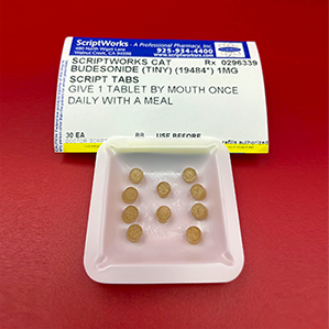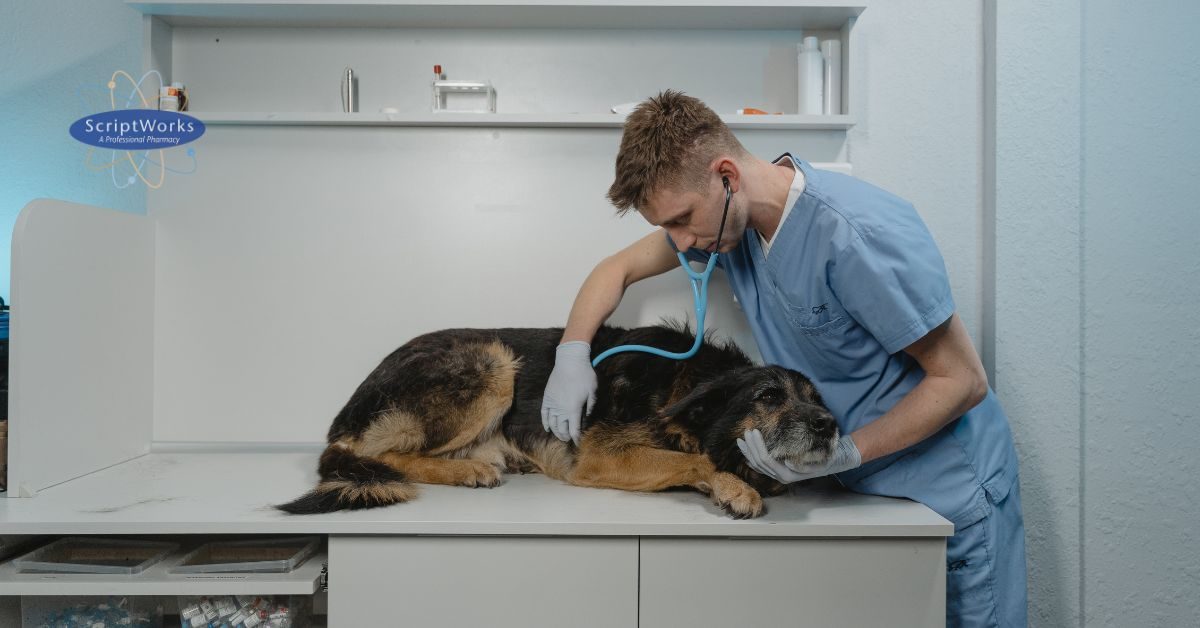
Author: Bob Brensel | President, Pharmacist | ScriptWorks
Bob Brensel, RPh, earned his Pharmacy Degree at University of the Pacific in Stockton, California in 1980. Former California Pharmacists Association’s Award Winner for Recognition of Outstanding Achievement in Compounding Pharmacy. Read More →
Inflammatory Bowel Disease in California Pets: Could Budesonide Tiny Script Tabs Make a Difference?
Inflammatory Bowel Disease (IBD) affects countless dogs and cats across California, leading to chronic discomfort, digestive issues, and long-term nutritional concerns. As CA veterinary professionals work to provide pet owners with personalized, manageable options, budesonide — particularly in convenient compounded formats like Tiny Script Tabs — has emerged as an appealing choice. While each pet is unique, budesonide may offer potential benefits for specific cases of IBD, especially when customized formulations are needed.
In this article, we’ll explore what IBD is, why budesonide may be selected, and how Tiny Script Tabs may support easier administration and tailored care for California pets.
Understanding IBD in Dogs and Cats
Inflammatory Bowel Disease refers to a chronic inflammatory condition of the gastrointestinal (GI) tract. It’s not a single disease but a group of conditions characterized by persistent GI inflammation and a wide range of symptoms:
- Chronic diarrhea
- Vomiting
- Weight loss
- Changes in appetite
- Fatigue or reduced energy
- Discomfort during bowel movements
The underlying cause of IBD often involves an inappropriate immune response in the GI tract, possibly influenced by genetics, gut flora imbalance, food sensitivities, or environmental triggers.
Breed Predispositions
Several breeds are more frequently noted in clinical descriptions of IBD or chronic enteropathy:
- Dogs: German Shepherds, Labradors, Dobermans, Rottweilers, Pugs, Lhasa Apsos, Cocker Spaniels.
Source: International Journal of Veterinary Sciences and Animal Husbandry
- Cats: Siamese and other oriental breeds have been suggested in some literature to have a higher risk.
Source: Today’s Veterinary Practice
Why Veterinarians May Prescribe Budesonide
Budesonide is a glucocorticoid that may be used in veterinary medicine to help support GI health in pets diagnosed with IBD or similar chronic inflammatory conditions. Providers have widely studied budesonide in canine and feline patients for its potential benefits in managing inflammation localized to the intestines.
Veterinarians may consider prescribing budesonide in the following scenarios:
- Pets with moderate to severe GI inflammation: Especially where dietary adjustments alone have not produced improvement.
- When tailored dosing is needed: Budesonide may be suitable for animals that require precise medication adjustments.
- When ease of administration is a concern: Budesonide can be compounded into formats that are easier for pet owners to give.
- In multimodal care plans: Budesonide may be part of a broader strategy involving nutrition, probiotics, and veterinary monitoring.
What Animals May Benefit from Budesonide?
Budesonide may be beneficial for both dogs and cats diagnosed with chronic GI inflammation.
It is most commonly used in:
- Small to medium breed dogs diagnosed with IBD
- Cats that have ongoing vomiting or diarrhea not fully managed with diet
- Senior pets who may benefit from precise dosing strategies
- Pets with diet-sensitive GI issues where medication is needed alongside nutritional management

Veterinarians individualize decisions based on the pet’s size, symptoms, diagnostic results, and overall care goals.
The Role of Tiny Script Tabs in Veterinary Medicine
One of the emerging formats for delivering budesonide to pets is the Tiny Script Tab, specially developed by ScriptWorks Compounding Pharmacy, serving California statewide. We custom-compounded these as miniature tablets (typically around 3 mm wide) designed specifically for veterinary use. This dosage form offers several unique advantages:

1. Easier Administration
Many pets are averse to traditional pills. We designed Tiny Script Tab to be small and easy to swallow — an ideal solution for difficult-to-medicate pets.
2. Custom Dosing
Budesonide is often dosed based on body surface area or weight, especially in veterinary applications. We compound Tiny Script Tabs in custom strengths to allow for accurate, personalized dosing.
3. Improved Palatability
These tablets can be flavored, helping encourage acceptance in even the pickiest dogs and cats. This may improve consistency of administration at home, which is essential in chronic care.
4. Convenient Compounded Format
For pets that need precise doses or cannot tolerate traditional medication formats, compounded budesonide in Tiny Script Tabs offers a practical, user-friendly option. This may reduce stress for both the pet and the owner.
5. Supports Veterinary Goals
Because the medication is localized to the gut and the formulation is designed for ease and accuracy, Tiny Script Tabs may align with the broader goals of veterinarians who are aiming to support GI health while maximizing pet comfort and owner compliance.
When Might Budesonide Tiny Script Tabs Be Recommended?
Veterinarians in California and beyond may choose Tiny Script Tabs of budesonide in scenarios such as:
- Dogs with chronic enteropathy where individualized dosing is key
- Cats with persistent GI symptoms that require long-term support
- Pets needing a palatable, easier-to-give form of medication
- Patients already on a multimodal therapy plan that includes diet and nutraceuticals
We compound these tablets under veterinary direction and customized for each animal’s needs.
How Pet Owners Can Support the IBD Care Journey
If your pet has been diagnosed with IBD, here are a few steps to help support their care when medications like budesonide are prescribed:
- Follow Veterinary Guidance Closely: Your veterinarian will create a plan based on diagnostics, symptoms, and your pet’s health history.
- Ask About Formulation Options: If giving tablets is challenging, inquire about Tiny Script Tabs or other compounded forms that may improve ease and compliance.
- Maintain Consistent Nutrition: Diet plays a key role in managing IBD, and should be used in conjunction with any prescribed medication.
- Monitor Progress: Keep track of your pet’s appetite, stool consistency, and energy levels, and report changes to your veterinary team.
Why California Pet Owners Are Turning to Compounded Medications
Pet owners in California continue to increasingly seek alternatives that align with their expectations for individualized, compassionate care. Compounded medications like budesonide in Tiny Script Tabs reflect this approach — designed to be potentially easier to give, more comfortable for the pet, and flexible enough to meet specific veterinary protocols.
Veterinarians are also embracing these formulations to improve compliance and support long-term outcomes, particularly for pets living with chronic conditions like IBD.
Summary: A Tailored Option for GI Support
Budesonide Tiny Script Tabs represent an innovative option for veterinary professionals aiming to support gastrointestinal health in dogs and cats with IBD. The miniature size, custom dosage, and improved palatability may make it easier for pet owners to adhere to care plans, while allowing veterinarians to provide more nuanced, personalized approaches.
In a diverse and pet-loving state like California, solutions that cater to the needs of both the animal and the caregiver are essential. Tiny Script Tabs may help bridge the gap between GI support and real-world ease of administration.
References
- Dye, T. L., Diehl, K. J., Wheeler, S. L., & Westfall, D. S. (2013). Randomized, Controlled Trial of Budesonide and Prednisone for the Treatment of Idiopathic Inflammatory Bowel Disease in Dogs. Journal of Veterinary Internal Medicine, 27(6), 1385‑1391. https://doi.org/10.1111/jvim.12195
- Pietra, M., Fracassi, F., Diana, A., Gazzotti, T., Bettini, G., Peli, A., Morini, M., Pagliuca, G., & Roncada, P. (2013). Plasma concentrations and therapeutic effects of budesonide in dogs with inflammatory bowel disease. American Journal of Veterinary Research, 74(1), 78‑83. https://doi.org/10.2460/ajvr.74.1.78
- Stroup, S. T., Behrend, E. N., Kemppainen, R. J., & Smith‑Carr, S. (2006). Effects of oral administration of controlled‑ileal‑release budesonide and assessment of pituitary‑adrenocortical axis suppression in clinically normal dogs. American Journal of Veterinary Research, 67(7), 1173‑1178. https://doi.org/10.2460/ajvr.67.7.1173
- Trepanier, L. (2009). Idiopathic inflammatory bowel disease in cats: rational treatment selection. Journal of Feline Medicine and Surgery, 11(1), 32‑39. Link
- Tumulty, J. W., Broussard, J. D., Steiner, J. M., Peterson, M. E., & Williams, D. A. (2004). Clinical Effects of Short‑Term Oral Budesonide on the Hypothalamic‑Pituitary‑Adrenal Axis in Dogs With Inflammatory Bowel Disease. Journal of the American Animal Hospital Association, 40(2), 120‑123. https://doi.org/10.5326/0400120

